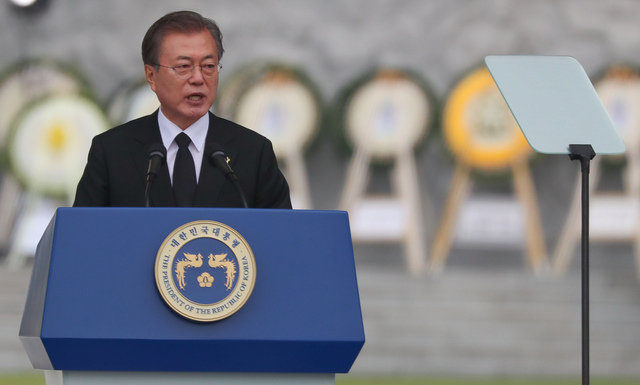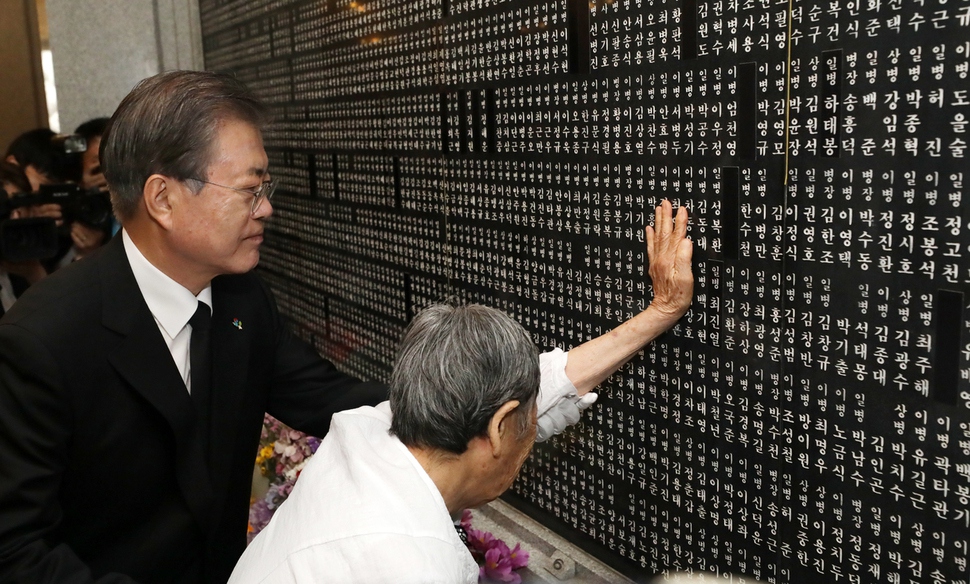 |
|
South Korean President Moon Jae-in delivers a speech during a ceremony marking 64th Memorial Day at the National Cemetery in Seoul, on June 6. (Blue House photo pool)
|
S. Korean president defines patriotism as transcending political divisions
South Korean President Moon Jae-in declared that “there are no divisions of ‘conservative’ and ‘progressive’ when it comes to patriotism” in his commemorative address for Memorial Day on June 6.
He also predicted that South Korea “can develop into a unified society when we conceive of patriotism within common sense lines rather than skewing toward extremes.”
“In the Republic of Korea today, the histories of conservatism and progressivism are intertwined. I respect all patriotism, whether it is conservative or progressive,” he added. His remarks read as an appeal to unite South Korean society – which is facing intensifying political and economic polarization – under the value of patriotism, redefining a term that has been effectively monopolized by conservatives into a universal community value transcending political identity and generations.
“Patriotism transcends class and ideology”
“Patriotism” was one of the most frequently occurring words in Moon’s commemorative address that day – appearing a total of 11 times. He also mentioned the terms “conservative” and “progressive” nine times each. The numbers offer evidence of his emphasis on the importance of patriotism as a “value of unity” transcending ideology.
In his address, Moon broadly defined patriotism as “a spirit that regards the fate of the national community as our own fate.” His message identified the essence of patriotism as lying in a “sense of oneness with the national community” and “devotion to the national community.” In the process, he mentioned the examples of Chae Myeong-sin, a former commander of the South Korean forces during the Vietnam War, and Lee Sang-ryong and Lee Hoe-yeong, Confucian scholars who spearheaded the establishment of the Shinheung Military Academy. Moon focused on the “selfless dedication” shown by historical figures “forsaking vested interests” as examples of the kind of patriotism needed by South Korean society – noting that while all three had conservative rules in the military and Confucian scholarship, Chae was ultimately buried “in a one-pyeong [3.31㎡] sodier’s grave rather than an eight-pyeong [26.45㎡] general’s grave,” while Lee Sang-ryong and Lee Hoe-young “donated their entire personal fortunes to the independence movement.”
In previous Memorial Day addresses in 2017 and 2018, Moon expanded the definition of patriotism from its narrow sense of “rescuing the country from war and other forms of crisis” to a broader concept of “dedication to the community.” Examples included his references to the dedication of miners and nurses sent to Germany and female workers on Seoul’s Cheonggye Stream (in his 2017 address) and the sacrifices of a mechanic who died rescuing a child from the sea and a daycare center teacher who died helping car accident victims (in his 2018 address) as falling within the definition of “patriotism.”
 |
|
South Korean President Moon Jae-in stands next to Kim Cha-hee, 93, who lost her husband in the Korean War, as Kim weeps at the Seoul National Cemetery on June 6, Korea’s Memorial Day. (Blue House photo pool)
|
“ROK armed forces rooted in Independence Army uniting left and right”
Moon also sent a clear message to conservatives.
“I respect all patriotism, whether it is conservative or progressive,” he said.
“The age when we could divide society dualistically into ‘conservatives’ and ‘progressives’ has passed. Today, everyone is in some ways both conservative and progressive,” he added. His message read as a call for progressives and conservatives to leave behind their old political “camp” divisions and join forces under the value of patriotism, competing or cooperation according to each individual issue.
“Whether we think of ourselves as conservative or as progressive, we can develop into a unified society when we conceive of patriotism within common sense lines rather than skewing toward extremes,” he said.
As an example, he referred to the collaboration between left and right that was a focused pursuit of the Korean Provisional Government in the 1940s.
“The Korean people’s independence campaign capabilities were ultimately harnessed when first the Korean Youth Battlefield Mission Corps and then the Korean Volunteers Army led by Kim Won-bong were incorporated into the Independence Army,” he said.
“It was through that strength that we fought against the Japanese alongside the British on the India-Burma front in 1943, and were liberated in 1945 while preparing with the US Office of Strategic Services for a Korean advance operation,” he continued.
He went on to say that the “military capabilities developed by the integrated Independence Army with the Allies became the roots for the establishment of the Republic of Korea armed forces and the foundation for the South Korea-US alliance after liberation.” His message was that a history of cooperation, which both sides cooperating to achieve independence rather than succumbing to factionalism and ideology, was the cornerstone for the Republic of Korea today.
“Coming at a time when both conservatives and progressives tend to focus on the interests of their own affiliations rather than the interests of the community, his Memorial Day message was that we need to let go of these factional interests and proceed in unity,” a key Blue House official said.
“The state’s obligation is to repay dedication”
In contrast with past commemorative addresses by Moon, the latest included a notable emphasis on the importance of the South Korea-US alliance.
“The US is the country that endured the greatest sacrifices for the sake of freedom and peace in this land. Over 33,000 US soldiers died on the battlefield [in the Korean War], and another 92,000 were wounded,” he said.
He also said the South Korean government “will be building a ‘wall of remembrance’ within the Korean War Veterans Memorial in Washington by 2022.”
“We will be honoring the honorable sacrifices of each of the US soldiers who died, inscribing the nobility of the South Korea-US alliance in the hearts of people in both countries,” he said. His message appeared to target both conservatives who have denounced his administration for “destroying the South Korea-US alliance” and progressives who assign the alliance lesser significance.
Toward the end of the speech, Moon mentioned the achievements of his administration’s policies for veterans and plans for the pursuit of additional ones in the future. Examples included plans for enactment of an accident compensation law for government employees, an increase in pensions for those killed on the job, establishment of a patriots’ center in Goesan, legislation of a citizen participation system for veteran compensation reviews, and enactment of an accident compensation law for soldiers. While lighting incense at an altar that day, Moon also sought out the parents of Choi Jong-geun – a petty officer first class killed in an accident while returning from a mission in Somalia on the ROKS Choe Yeong with the Cheonghae Anti-Piracy Unit – and encouraged them to light incense as well.
The commemorative ceremony at Seoul National Cemetery was attended by Moon, officials from five ministries, representatives of ruling and opposition parties, persons of national merit, and surviving family members of persons of merit.
By Lee Wan, staff reporter
Please direct comments or questions to [english@hani.co.kr]










